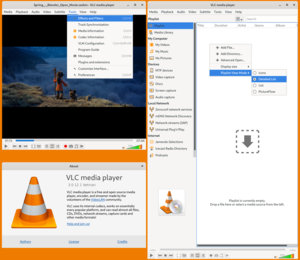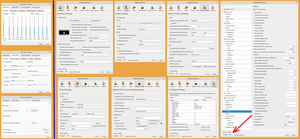
Back مشغل الوسائط في إل سي Arabic VLC media player AST VLC media player Azerbaijani VLC media player Bulgarian ভিএলসি মিডিয়া প্লেয়ার Bengali/Bangla VLC media player Breton VLC media player Catalan ڤی ئێل سی میدیا پلەیەر CKB VLC media player Czech VLC Welsh
top: VLC 3.0.12 (running on Linux and GNOME, playing Spring, a short film by the Blender Foundation) bottom: VLC 3.0.10 preferences and effects | |||||||||||||
| Developer(s) | VideoLAN | ||||||||||||
|---|---|---|---|---|---|---|---|---|---|---|---|---|---|
| Initial release | February 1, 2001[1] | ||||||||||||
| Stable release(s) [±] | |||||||||||||
| |||||||||||||
| Repository | |||||||||||||
| Written in | Core: C GUI: C++ (with Qt), Objective-C (with Cocoa), Swift, Java Bundled Extensions: Lua[9] | ||||||||||||
| Operating system | Windows, Windows Phone, ReactOS, macOS, Linux, Android, Android TV, ChromeOS, iOS, iPadOS, tvOS, watchOS, Xbox system software | ||||||||||||
| Platform | IA-32, x86-64, ARM, ARM64, MIPS, PowerPC | ||||||||||||
| Available in | 106 languages[10] | ||||||||||||
| Type | Media player | ||||||||||||
| License | GPL-2.0-or-later with some libraries under LGPL-2.1-or-later[11][12] VLC for iOS (MPLv2.0) | ||||||||||||
| Website | videolan.org/vlc | ||||||||||||
VLC media player (previously the VideoLAN Client and commonly known as simply VLC) is a free and open-source, portable, cross-platform media player software and streaming media server developed by the VideoLAN project. VLC is available for desktop operating systems and mobile platforms, such as Android, iOS and iPadOS. VLC is also available on digital distribution platforms such as Apple's App Store, Google Play, and Microsoft Store.
VLC supports many audio- and video-compression-methods and file-formats, including DVD-Video, Video CD, and streaming-protocols. It is able to stream media over computer networks and can transcode multimedia files.[14]
The default distribution of VLC includes many free decoding and encoding libraries, avoiding the need for finding/calibrating proprietary plugins. The libavcodec library from the FFmpeg project provides many of VLC's codecs, but the player mainly[15] uses its own muxers and demuxers. It also has its own protocol implementations. It also gained distinction as the first player to support playback of encrypted DVDs on Linux and macOS by using the libdvdcss DVD decryption library; however, this library is legally controversial and is not included in many software repositories of Linux distributions as a result.[16][17] It is available on iOS under the MPLv2.[18]
- ^ "15 years of VLC and VideoLAN". Jean-Baptiste Kempf. Retrieved April 15, 2017.
- ^ "3.0.21". June 5, 2024. Retrieved June 6, 2024.
- ^ "3.5.4". July 6, 2023. Retrieved October 31, 2023.
- ^ "VLC - Chrome Web Store". December 23, 2015. Retrieved April 4, 2022.
- ^ "VLC media player on the App Store". Retrieved January 7, 2025.
- ^ "Official Download of VLC media player for Windows Store - VideoLAN". www.videolan.org. VideoLAN. July 20, 2018. Retrieved August 7, 2018.
- ^ "Get VLC - Microsoft Store". www.microsoft.com. VideoLAN. July 20, 2018. Retrieved August 7, 2018.
- ^ "Official Download of VLC media player for Windows Phone - VideoLAN". www.videolan.org. VideoLAN. July 20, 2018. Retrieved August 7, 2018.
- ^ "VLSub". addons.videolan.org.
- ^ "VideoLAN internationalization". VideoLAN. Retrieved June 6, 2024.
- ^ "VLC engine relicensed to LGPL". VideoLAN. December 21, 2011. Retrieved April 15, 2017.
- ^ "VLC reaches 2.1.2". VideoLAN. December 10, 2013. Retrieved April 15, 2017.
- ^ "VLC media player, Index of /testing/". Retrieved February 9, 2018.
- ^ "VLC Features". VideoLAN. Retrieved April 15, 2017.
- ^ "Contrib Status – VideoLAN Wiki". wiki.videolan.org. Retrieved July 15, 2017.
- ^ "libdvdcss – VideoLAN". www.videolan.org. Retrieved February 8, 2020.
- ^ Hoffman, Chris (March 2013). "Why Watching DVDs on Linux is Illegal in the USA". How-To Geek. Retrieved February 8, 2020.
- ^ "VLC for Mobile". App Store. Retrieved November 16, 2021.

